|
|
|
Sort Order |
|
|
|
Items / Page
|
|
|
|
|
|
|
| Srl | Item |
| 1 |
ID:
105401
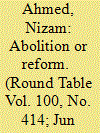

|
|
|
|
|
| Publication |
2011.
|
| Summary/Abstract |
This paper explores the characteristics, performance and pitfalls of the non-party caretaker government (NPCG) system that Bangladesh has developed to ensure foolproof parliamentary elections and an orderly succession of government. This system differs from the traditional system of the succession of government in a number of ways: first, none of the caretakers (members of NPCG) can be a member of the outgoing government; second, no caretaker can contest the elections; and third, none can also be a member of any political party. The NPCG can undertake only election-related activities; it is not authorised to take any major policy decision. The article examines the context within which the successive caretaker governments (since 1991) have worked and compares and contrasts their performance. It shows that although initially appreciated for its unique contribution to the transition to democracy from authoritarianism, and particularly to the orderly succession of government, the NPCG system has recently been attacked and seemingly rejected by those who were instrumental in its creation-party politicians. This paper explores the logic and politics underlying the shift in party attitude towards the NPCG system, arguing that the latter probably outweighs the former. It suggests that the system needs reform, not abolition.
|
|
|
|
|
|
|
|
|
|
|
|
|
|
|
|
| 2 |
ID:
133220


|
|
|
|
|
| Publication |
2014.
|
| Summary/Abstract |
THE RECENT LITERATURE ON CIVIL WARS IS WIDE and deep; a number of major studies compel us to rethink what we know about this important subject. One of the areas that has eluded concerted scholarly attention has been the question of how national armies can be developed that satisfy the imperatives of post-civil war reconciliation and democratic consolidation. This issue is at the center of this article.
Civil wars are fought for different reasons in very different settings and are resolved differently. Nevertheless, it is possible to draw valuable lessons of building national armies from even highly disparate attempts in very different post-civil war environments. The principal goal of this article is to highlight, through their contrasting achievements and shortcomings, lessons we can learn from three cases.
|
|
|
|
|
|
|
|
|
|
|
|
|
|
|
|
| 3 |
ID:
146007
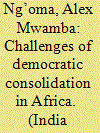

|
|
|
|
|
| Summary/Abstract |
In Africa, the dawn of political independence, which many countries experienced in the late 1950s and the early 1960s, ushered in political freedom but not economic prosperity. It was for this reason that the onset of the third wave of democratisation, which culminated into the end of the Cold War in 1989, came to be hailed by the African masses as a second form of liberation. The Africans hoped that democracy, once consolidated, would be the basis for economic development on their continent. This article observes, nonetheless, that democracy in many African countries has not proceeded to the expected phase of democratic consolidation due to several challenges that the article outlines. The article explains further that despite the uninspiring picture of political instability on the continent, Africa is actually home to at least six of the fastest growing economies in the world. The article, thus, suggests that India should not hesitate, but seek to increase its investment portfolio in Africa, since the continent’s unstable political environment is not at all inimical to foreign direct investment.
|
|
|
|
|
|
|
|
|
|
|
|
|
|
|
|
| 4 |
ID:
109127
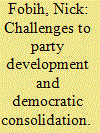

|
|
|
|
|
| Publication |
2011.
|
| Summary/Abstract |
The second half of the twentieth century witnessed the emergence of the party system and democracy in African countries, for example Ghana, in the period preceding the postcolonial era. This article looks at some of the challenges facing Ghana's democratic consolidation and party development, and some of the institutional benchmarks required to help to promote effectively an accountable, participatory and democratic party system in the country in order to consolidate further its democracy. The study concludes with the view that regardless of their apparent weaknesses, political parties in Ghana are generally important institutions that grease the wheels of the country's democratic governance in the post-transition era.
|
|
|
|
|
|
|
|
|
|
|
|
|
|
|
|
| 5 |
ID:
132939
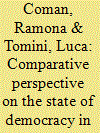

|
|
|
|
|
| Publication |
2014.
|
| Summary/Abstract |
The scholarship on Central and Eastern European politicsand societies is well established in the literature. Over the past two decades, scholars have addressed a variety of topics including the role of civil society in transition and democratic consolidation (Linz & Stepan 1996a, 1996b; P?ibá? & Young 1999; Pridham 2001; Pollack & Wielgohs 2004); the process of institution-building and the functioning of institutions (Karp 1994; Zielonka 2001; Malova & Haughton 2002); the development of political parties and their contribution to democracy (Kitschelt 1992; De Waele 1999; Lewis 2001, 2008; Hough 2005; Deegan-Krause & Haughton 2010; Burnell & Gerrits 2010); the role of external actors in the process of consolidation of democracy, and in particular the role of the EU and the enlargement process (Papadimitriou 2002; Dimitrova 2004; Schimmelfennig & Sedelmeier 2005; Vachudova 2005; Epstein & Sedelmeier 2009; Morlino & Sadurski 2010; O'Brennan 2011); populist parties (Mudde 2007; De Waele & Pacze?niak 2010; Pankowski 2011) and the ambiguous role of nationalism (Latawski 1994; Auer 2004); the problem of the rights of ethnic, linguistic, religious and national minorities (Taras 1998; Rechel 2009); the relationship between justice and politics (Anderson et al.2005; Coman & De Waele 2007; Coman 2009; Piana 2010); the construction of a market economy and the relationship between democracy and economic policies (Jeffries 1996; Stark & Bruszt 1998; Hasselman 2006; Myant & Drahokoupil 2010); political cultures (Pollack 2003; Klingemann 2008); the problems related to corruption (Smilov & Toplak 2007; Schmidt-Pfister & Moroff 2012); and the development of regionalisation and the role of local governments (Hughes et al.2004a, 2004b; Coulson & Campbell 2007).
|
|
|
|
|
|
|
|
|
|
|
|
|
|
|
|
| 6 |
ID:
047177
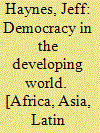

|
|
|
|
|
| Publication |
Cambridge, Polity Press, 2001.
|
| Description |
248p.
|
| Standard Number |
0745621422
|
|
|
|
|
|
|
|
|
|
|
|
Copies: C:1/I:0,R:0,Q:0
Circulation
| Accession# | Call# | Current Location | Status | Policy | Location |
| 044963 | 321.8/HAY 044963 | Main | On Shelf | General | |
|
|
|
|
| 7 |
ID:
129087
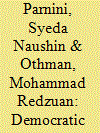

|
|
|
|
|
| Publication |
2014.
|
| Summary/Abstract |
In recent years efforts have been made to improve governance by ensuring institutional performance and policing for greater transparency to sustain liberal democracy in Bangladesh and elsewhere. Since gaining independence in 1971, The People's Republic of Bangladesh has been driven by internal power struggles and economic chaos, while attempting to develop a democratic society. A predominately Islamic country, Bangladesh's representative government is battling poverty and rampant corruption. Although this study appreciates what Bangladesh has achieved so far, it seeks to deviate from the general trend that romanticizes Bangladesh's democracy and its recent connection with new governance parameters. This study attempts to identify some of the major paradoxes that Bangladesh's democracy is faced with. All these factors will be analyzed in the context of a contemporary notion of governance and democracy in Bangladesh.
|
|
|
|
|
|
|
|
|
|
|
|
|
|
|
|
| 8 |
ID:
111924
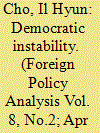

|
|
|
|
|
| Publication |
2012.
|
| Summary/Abstract |
During his tenure, President George W. Bush touted the East Asian democratic experience as a positive model for democratization in the Middle East. Contrary to the premise of democracy leading to regional stability, however, East Asian democracies in the past decade have often become a source of regional instability. Based on a comparative analysis of political developments in Taiwan, Japan, and South Korea, this paper explores the foreign policy behavior of East Asian democracies and assesses the overall impact on regional security dynamics. Specifically, I argue that incomplete democratic consolidation, combined with the political salience of national identity, sparked a process of acute intergroup competition among domestic political actors. As a result, the foreign policy orientation of the three East Asian democracies became belligerent, thereby unnecessarily increasing regional tensions.
|
|
|
|
|
|
|
|
|
|
|
|
|
|
|
|
| 9 |
ID:
144303
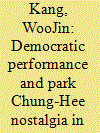

|
|
|
|
|
| Summary/Abstract |
Why, a quarter century after democratization, are Korean citizens so nostalgic about the former authoritarian Park Chung-hee government? What are the implications of this support for Korea's democratic deepening? To answer these questions, I offer empirical analyses of selected data from the Korea Democracy Barometer 2010 survey that confirm the relevance of two dimensions of political support to authoritarian nostalgia in Korea: the life biography model and the economic performance model at the system level. The results suggest a double-sided phenomenon: on the one hand, nostalgia based on a retrospective collective memory; on the other, citizens' critical view of the performance deficits of post-Park democratic governments in dealing with inequality in Korean society. As the findings elucidate, in spite of the challenges they face, emergent democratic governments must perform more effectively if they are to win citizens' support.
|
|
|
|
|
|
|
|
|
|
|
|
|
|
|
|
| 10 |
ID:
062549
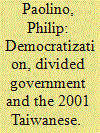

|
|
|
|
|
| Publication |
Feb-Apr 2005.
|
|
|
|
|
|
|
|
|
|
|
|
|
|
|
|
| 11 |
ID:
159903


|
|
|
|
|
| Summary/Abstract |
In democracies with stable party systems, voters can more easily trace policy decisions from parties and representatives within the government to specific policy outcomes. Consequently, party system stability (PSS) has been reportedly linked to a variety of factors including economic conditions, democratic performance, political institutions, and socioeconomic cleavages. While informative, these lessons offer precious little insight into other factors that can destabilize a party system. In this work, we surmise that terrorist attacks have important implications for two commonly used measures of PSS. The results of a pooled, cross-sectional time series analysis confirm our hypothesis: deadly attacks proximate to elections destabilize party systems, even when controlling for multiple standard controls. In addition, the level of democratic consolidation within states also influences the degree that fatal terrorist attacks affect party system stability. These findings are based on terrorism data collected from the Global Terrorism Database and from PSS data compiled by the authors.
|
|
|
|
|
|
|
|
|
|
|
|
|
|
|
|
| 12 |
ID:
163920
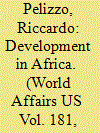

|
|
|
|
|
| Summary/Abstract |
The purpose of this article is to analyze Africa’s progress along the developmental path in the past few decades, to understand what factors were responsible for such success and to identify the risk factors that may compromise further development in the region in the years to come. We advance three basic claims: that Africa has experienced an almost unprecedented (by its standards) level of economic success in the first 15 years of the new millennium, that this success was made possible by a combination of domestic and supranational conditions, and that some of the enabling conditions that supported Africa’s growth and development in the new millennium may be disappearing. The study also suggests that while African countries may not be able to influence the global conditions on which their economic success depends, they do have the ability to influence the domestic conditions. This is why, we suggest, in addition to ensuring longer and healthier lives for their citizens, African countries should consolidate democracy and promote good governance.
|
|
|
|
|
|
|
|
|
|
|
|
|
|
|
|
| 13 |
ID:
089923
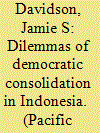

|
|
|
|
|
| Publication |
2009.
|
| Summary/Abstract |
This article grapples with the tricky issue of democratic consolidation in post-Soeharto Indonesia. It recognizes the great strides the country has made toward establishing a rights-based democracy. This includes attempts to tackle the legacies of decades-long authoritarianism - for instance, those times when state elites have put self-interestedness aside to cooperate in the establishment of new institutions that promote genuine democratization. This article argues, however, that democratic consolidation in Indonesia will continue to be bedeviled due to the poor institutionalization of a democratic rule of law. Until state elites and government officials predictably can be relied upon to enforce democratic institutions, and are subject to the law themselves, then a meaningful deepening of Indonesia's elitist/electoral democracy will be unobtainable.
|
|
|
|
|
|
|
|
|
|
|
|
|
|
|
|
| 14 |
ID:
156696
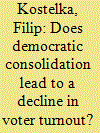

|
|
|
|
|
| Summary/Abstract |
This article challenges the conventional wisdom that democratic consolidation depresses voter turnout. Studying democratic legislative elections held worldwide between 1939 and 2015, it explains why voting rates in new democracies decrease when they do, how much they decrease, and how this phenomenon relates to the voter decline observed in established democracies. The article identifies three main sources of decline. The first and most important is the democratization context. When democratizations are opposition-driven or occur in electorally mobilized dictatorships, voter turnout is strongly boosted in the founding democratic elections. As time passes and the mobilizing democratization context loses salience, voting rates return to normal, which translates into turnout declines. The second source is the democratic consolidation context, which seems to depress voter turnout only in post-Communist democracies. Finally, new democracies mirror established democracies in that their voting rates have been declining since the 1970s, irrespective of the two previous mechanisms.
|
|
|
|
|
|
|
|
|
|
|
|
|
|
|
|
| 15 |
ID:
088452
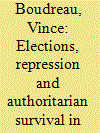

|
|
|
|
|
| Publication |
2009.
|
| Summary/Abstract |
This paper compares post-transition Philippines and Indonesia, examining the ways in which authoritarian practices survive and are shaped by regime transition. It examines the transition process in each case, to identify the problems of management and control that regime elites set for themselves in the post-dictatorship period. It is argued that Philippine elites set out to disaggregate and domesticate an already mobilized opposition movement, while the Indonesian authorities strove to keep similar popular politics from mobilizing. The paper then considers how these political objectives find expression in the structuring of two important institutional fields - the electoral and policy making processes - concluding with an examination of how these considerations influence patterns of repression. In particular, the paper also investigates whether repression targets primarily proscribed modes of activity, or sets out to threaten and intimidate proscribed organizations and people. Differences in electoral and policy processes, as well as in patterns of repression, demonstrate the ways in which authoritarianism can survive regime transitions and can undermine the promise of democracy in the post-dictatorship period.
|
|
|
|
|
|
|
|
|
|
|
|
|
|
|
|
| 16 |
ID:
109068
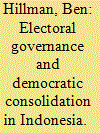

|
|
|
| 17 |
ID:
157794
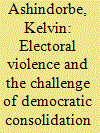

|
|
|
|
|
| Summary/Abstract |
Elections are the hallmarks of democracy; they also serve the purpose of peaceful change in government and confer political legitimacy on the government. Viewed from this prism, elections represent the expression of the sovereign will of the people. However, the conduct of elections in a plural society like Nigeria is often fraught with animosities and violence. Failing is the process to satisfy the test of popular participation and legitimacy. At the core of this bitter contest is the struggle for power by factional elite groups perceived as representing ethno religious and regional interest. Electoral seasons more than anytime else reveals the fragility and soft underbelly of the Nigerian state. The country’s electoral history is replete with narratives of flawed and disputed elections that have turned violent, resulting in numerous fatalities and reversing previous attempts at democratic consolidation. The 2015 general election was unprecedented in the annals of the country because for the first time an entrenched and incumbent party was defeated at the polls, and the country witnessed a peaceful alternation of power between contending political parties thereby fulfilling one of the preconditions for democratic consolidation. A tensed pre-election political atmosphere occasioned by the activities of the terrorist group, Boko Haram, that then controlled a large swath of Nigeria’s territory and a fragmented elite divided along ethno-religious and regional lines foreshadowed the election. Shuttle diplomacy by the United States secretary of state and the constitution of body called ‘National Peace Committee’ comprised of Kofi Anan, the immediate past secretary general of the United Nations, past presidents of Nigeria and leading clergymen and the postponement of the election date by six weeks before the electoral management body could deliver an election whose outcome was accepted by the contending political parties and averting the prediction of an apocalyptic endgame. This study seeks to engage the factors that make conduct of elections in Nigeria to be violent prone and undermine attempts at institutionalising a democratic tradition. The methodology is qualitative in approach, relying on secondary data from books, journal articles and newspaper commentaries.
|
|
|
|
|
|
|
|
|
|
|
|
|
|
|
|
| 18 |
ID:
062548
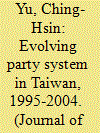

|
|
|
|
|
| Publication |
Feb-Apr 2005.
|
|
|
|
|
|
|
|
|
|
|
|
|
|
|
|
| 19 |
ID:
133096
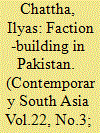

|
|
|
|
|
| Publication |
2014.
|
| Summary/Abstract |
This essay provides new evidence on local Pakistani politics in the immediate post-independence period. It reveals that far from being a period of national unity and service to the fledgling state, the country was mired in faction-building strategies between political rivals, competing for power and scrambling for resources, with debilitating consequences for democratic consolidation. While the new sources - largely based upon the archival records deposited at the National Documentation Centre, Islamabad - provide material relating primarily to Punjab, this essay demonstrates that the tensions between central government and the provinces can only be comprehended by reference to studies of localities.
|
|
|
|
|
|
|
|
|
|
|
|
|
|
|
|
| 20 |
ID:
094492
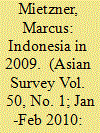

|
|
|
|
|
|
|
|